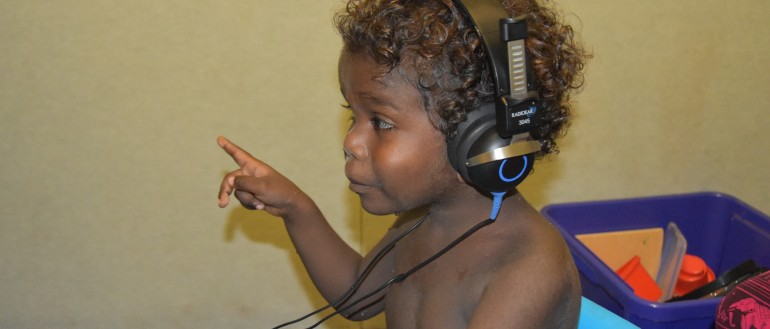Hearing loss is not just about “ears”. Ear disease affects speech and language development, many of life’s enjoyments, and access to culture, education, and employment. Children with ear problems cannot hear properly – they have trouble listening and talking, and may behave badly because they misunderstand their parents, teachers, and friends. If left untreated ear disease can have a significant impact on a child’s development and entire life trajectory.
The Hearing for Learning Initiative (HfLI, the ‘Initiative’) July 2018 – December 2023 is a $6.4m community-based service enhancement program. It aims to integrate locally based Ear Health Facilitators into existing services to assist Aboriginal and Torres Strait Islander children with ear and hearing problems. Over a five-year period, the program will work with 20 communities, employ up to 40 part time ear health facilitators, and screen 5,000 children aged 0-16 years. The goal is to work with communities to establish reliable, sustainable, culturally appropriate services that ensure every ear of every child is healthy and hearing every day.
The Initiative will assess the effect of a novel innovation (enhanced ear health services) on children’s health and education outcomes. The Initiative is a Phase III stepped-wedge cluster randomised trial which will roll out the ear health service enhancement in ‘clusters’ of communities, selected randomly from a pool of 20. Random allocation makes it fair and helps to remove bias. In each community, six weeks of paid, on-country training will be provided for five local, Aboriginal and/or Torres Strait Islander community members. Training includes three accredited units in work readiness and primary healthcare, and four weeks of theoretical and practical training in ear disease and ear and hearing assessment. Graduates can then apply for the Ear Health Facilitator position(s) at the local health service, where they will be employed part time to screen children’s ears and hearing for signs of ear disease, support families of children with ear disease, work with visiting hearing services, promote healthy ears, and be the communities ear health champion. The Initiative reimburses the health service for 0.5FTE or 2x0.25FTE positions and provides regular face to face and phone support of integration and employment of Ear Health Facilitators to end 2023..
Program goals:
Work with up to 20 remote, rural or urban communities to establish reliable, sustainable, culturally appropriate services that ensures that every ear of every child is healthy and hearing every day.
- Work with up to 20 remote, rural or urban communities to establish reliable, sustainable, culturally appropriate services that ensures that every ear of every child is healthy and hearing every day.
- Training 100 local community members and employment of up to 40 ear health facilitators.
- Training in ear and hearing clinical skills and knowledge.
- Mentoring and integration of Ear Health Facilitators into the health service
- Delivery of education programs to help identify children with hearing problems.
- A significant increase in the number of children aged 0 -16 years of age who receive ear and hearing assessments during the program.
Co-Chairs and Research Executive Committee:
- Professor Amanda Jane Leach AM, Leader, Ear Health Research Program
- Professor Kelvin Kong AM, Proud Worimi man, ENT surgeon
- Professor Alan Cass, Menzies, Director
- Professor Peter Morris, Consultant Paediatrician, Royal Darwin Hospital
Research team
- Ms Amelia McCullough, Clinical Trial Team Manager.
- Ms Sandra Godfrey, Project Coordinator
- Ms Emily Websdale, Clinical Training Research Officer
- Mr Tarrant Tolotta, Research Nurse
- Dr. Jiunn-Yih Su, Data Analyst/ Manager
- Ms Rebecca Bradley, Health Economics Research Assistant
- Dr Victor Oguoma, Biostatistician (UQ Poche institute)
- Professor Angela Devine, Health Economist
Program dates
- July 2018 - December 2024
Contact us
- Professor Amanda Leach, Senior Principal Research Fellow, Amanda.Leach@menzies.edu.au, 08 8946 8560
- Ms Amelia McCullough, Clinical Trial Team Manager, Amelia.McCullough@menzies.edu.au, 0436 835 569

